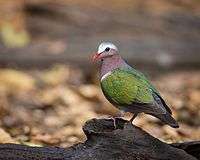Common emerald dove
| Common emerald dove | |
|---|---|
 | |
| Scientific classification | |
| Kingdom: | Animalia |
| Phylum: | Chordata |
| Class: | Aves |
| Order: | Columbiformes |
| Family: | Columbidae |
| Genus: | Chalcophaps |
| Species: | C. indica |
| Binomial name | |
| Chalcophaps indica (Linnaeus, 1758) | |
| Subspecies | |
|
See text | |
| Synonyms | |
|
Asian emerald dove | |
The common emerald dove, Asian emerald dove, or grey-capped emerald dove (Chalcophaps indica) is a pigeon which is a widespread resident breeding bird in the tropical and sub-tropical parts of the Indian Subcontinent and east through Myanmar, Vietnam, Thailand, Malaysia, the Philippines, Taiwan, the Sakishima Islands of Japan and Indonesia. The dove is also known by the names of green dove and green-winged pigeon. The common emerald dove is the state bird of the Indian state of Tamil Nadu. The Pacific emerald dove and Stephan's emerald dove were both considered conspecific.
Description
This is a common species in rainforest and similar dense wet woodlands, farms, gardens, mangroves and coastal heaths. It builds a scant stick nest in a tree up to five metres and lays two cream-coloured eggs.
Its flight is fast and direct, with the regular beats and an occasional sharp flick of the wings which are characteristic of pigeons in general. It often flies low between the patches of dense forest it prefers, but when disturbed will frequently walk away rather than fly. They are particularly good weavers when flying through forests. When flying they expose a buff underwing and a chestnut colour of their flight feathers.
The common emerald dove is a stocky, medium-sized pigeon, typically 23 to 28 centimetres (10 to 11.2 inches) in length. The back and wings are bright emerald green. The flight feathers and tail are blackish, and broad black and white bars show on the lower back in flight. The head and underparts are dark vinous pink (in chrysochlora, more brown in longirostris), fading to greyish on the lower belly. The eyes are dark brown, the bill bright red and legs and feet rufous.
.jpg)
_-_Flickr_-_Lip_Kee_(1).jpg)
The male has a white patch on the edge of the shoulders and a grey crown, which the female lacks. Females will tend to have a browner complexion with a grey mark on the shoulder. Immature birds resemble females but have brown scallops on their body and wing plumage.
Emerald doves usually occur singly, pairs or in small groups. They are quite terrestrial, often searching for fallen fruit on the ground and spending little time in trees except when roosting. They eat seeds and fruits of a wide variety of plants and are generally tame and approachable.
The call is a low soft moaning cooing consisting of about six to seven coos starting quietly and rising. They also call a nasal "hoo-hoo-hoon". Males perform a bobbing dance during courtship.
Subspecies
The common emerald dove has six subspecies:
- C. i. indica (Linnaeus, 1758) - southeast Asia
- C. i. robinsoni Baker, 1928 - Sri Lanka
- C. i. maxima Hartert, 1931 - Andaman Islands
- C. i. augusta Bonaparte, 1855 - Nicobar Islands
- C. i. natalis Lister, 1889 - Christmas Island. This is the Christmas emerald dove.
- C. i. minima Hartert, 1931 - Numfor, Biak and Mios Num Islands
References
- ↑ BirdLife International (2016). "Chalcophaps indica". IUCN Red List of Threatened Species. Version 2016.1. International Union for Conservation of Nature. Retrieved 10 August 2016.
- Grimmett, Birds of India, Inskipp and Inskipp, ISBN 0-691-04910-6
External links
| Wikimedia Commons has media related to Chalcophaps indica. |
| Wikispecies has information related to: Chalcophaps indica |
